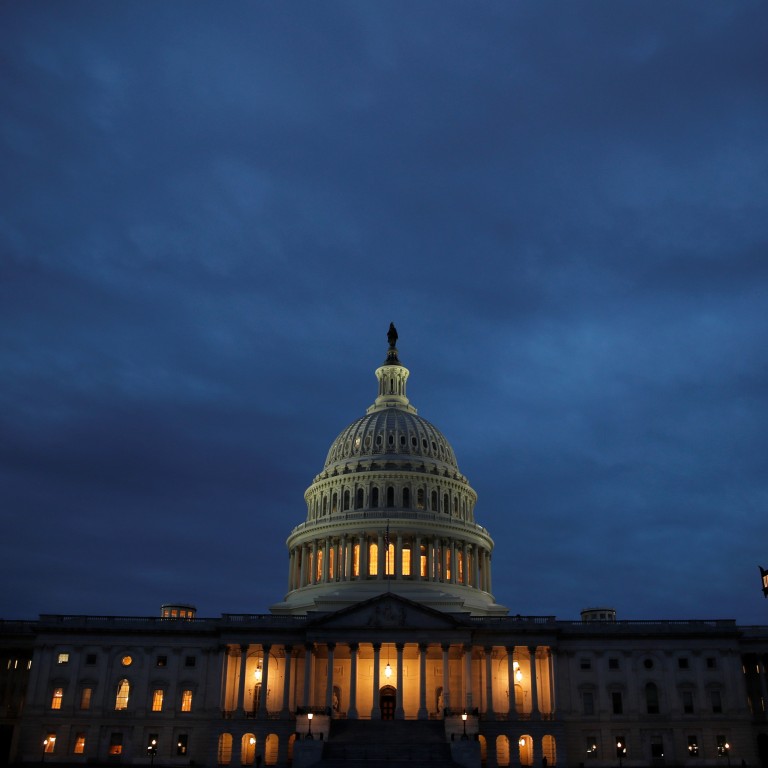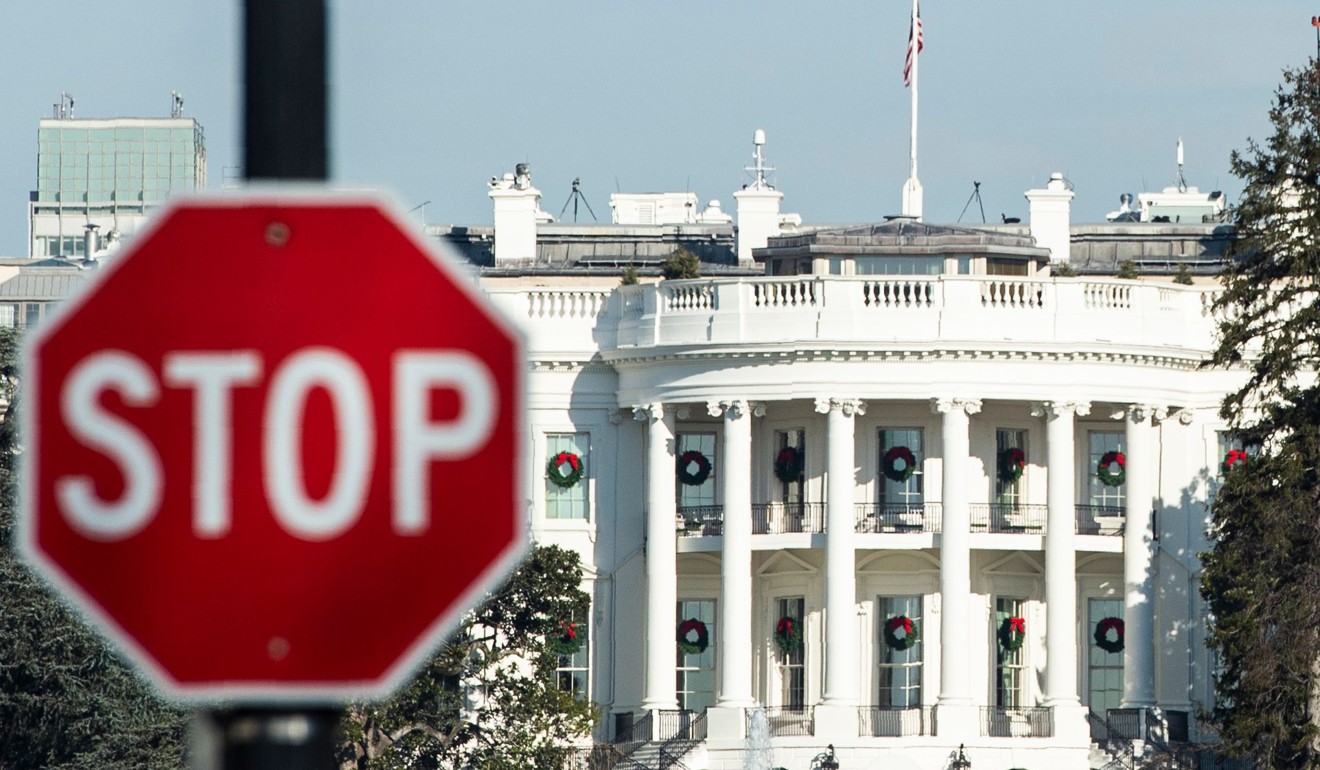
US federal government shutdown enters second week with no resolution in sight
- No sign of negotiations resuming on Sunday over Donald Trump’s demands for funding for a wall at the US-Mexico border
The partial federal government shutdown entered its second week on Sunday with top Republicans and Democrats continuing to dig in and shift blame, with no indication that direct negotiations are anywhere close to resuming before a new Congress gets to work on Thursday.
The conflict remains centred on President Donald Trump’s wish for a physical wall at the US-Mexico border, but even the nature of that demand become freshly mired in controversy after John Kelly, the outgoing White House chief of staff, said the administration had long since moved away from the concrete barrier Trump has often described in rapturous terms.
“To be honest, it’s not a wall,” Kelly told The Los Angeles Times for a story published Sunday, adding that “we left a solid concrete wall early on in the administration, when we asked people what they needed and where they needed it.” Recently, Trump has taken to describing a wall made of “steel slats”.

Trump counsellor Kellyanne Conway said Sunday morning that it was a “silly semantic argument” to debate what the border wall would be made of and sought to blame Democrats for refusing to compromise on the president’s demand for billions of US taxpayer dollars for a wall that he repeatedly said Mexico would finance.
“There may be a wall in some places. There may be steel slats. There may be technological enhancements,” she said on Fox News Sunday. “But always saying wall or no wall is being very disingenuous and turning a complete blind eye to what is a crisis at the border.”
A Trump-backed spending bill passed by House Republicans on December 21 included more than $5 billion in border security funding that could be spent on a wall, but that measure has not got traction in the Senate, where Democrats have stood firm on holding wall funding to the current US$1.3 billion level.
Sen. Jon Tester, D-Mont., speaking on CBS’ “Face the Nation”, said the Trump administration has “spent very little” of the US$1.3 billion that Congress allotted for physical border security improvements earlier this year.
“He says he needs more, yet there’s no plan (for) how the money is going to be spent or any analysis on what’s most effective to secure the border,” said Tester, the top Democrat on the Senate Appropriations subcommittee on Homeland Security. “I think we can do it with technology and manpower, and much more effectively than with a wall.”
Rep. Hakeem Jeffries, D-N.Y., chairman of the House Democratic Caucus, said congressional Democrats are “certainly prepared to provide additional funding for enhanced fencing, technology, drones, satellites, lighting, censors, cellphone towers and the things the experts have clearly indicated would improve our border security” but held firm against a physical wall.
“What Donald Trump and the Republicans want to do is waste US$5 billion in taxpayer money on an ineffective medieval border wall that is a 5th century solution to a 21st century problem,” he said on ABC’s “This Week”.
While those officials and others jousted on the Sunday television news programmes, there was no effort at direct talks between the warring parties.
Trump tweeted Saturday that he was “in the White House waiting for the Democrats to come on over and make a deal on Border Security.” Top Democrats, meanwhile, said they had made their position against additional wall funding known and awaited a counter-offer from Trump and Republicans.
“Our negotiations are at an impasse at the moment,” said Sen. Richard Shelby, R-Ala., chairman of the Senate Appropriations Committee, on “Face the Nation”. “I wish it were not so, but we’ve got to move away from the blame game … If we blame each other, this could last a long, long time.”
Other Republicans this weekend kept their fire trained on Democrats, seeking to shift blame for the shutdown – now the third-longest lapse in US history, affecting about 800,000 federal workers. Democrats have faulted Trump and the Republican Party since a December 11 Oval Office meeting with Democratic leaders where Trump declared he would be “proud” to partially close the federal government over his border wall demands.
In a tweet Sunday, Trump referred to the “#SchumerShutdown,” prompting resistance from the office of Senate Minority Leader Charles Schumer, D-N.Y.
“At this point, it’s clear the White House doesn’t know what they want when it comes to border security,” said Justin Goodman, a spokesman for Schumer. “While one White House official says they’re willing to compromise, another says the president is holding firm at no less than US$5 billion for the wall. Meanwhile, the president tweets blaming everyone but himself for a shutdown he called for more than 25 times.”
Conway, speaking on Fox, said the onus was on Democrats to reopen negotiations and called on House Minority Leader Nancy Pelosi, D-Calif. – who is set to be elected speaker Thursday – to “come back from Hawaii” where she had vacationed last week with her family.
“Less hula, more moola” for the Department of Homeland Security, she said.
Drew Hammill, a spokesman for Pelosi, said she had returned from Hawaii to her home in San Francisco late last week and plans to return to Washington on Monday as she prepares to be sworn in for her 17th term and lead the new House Democratic majority.
He said she last spoke to Trump on December 11, by phone hours after leaving the White House.
“Pelosi continues to urge the Republicans in charge of the House, Senate and White House to allow a vote to reopen government, and if they do not, Speaker Pelosi will on January 3,” he said.
But House Democrats alone will not be able to break the impasse. Senate Majority Leader Mitch McConnell, R-Ky., indicated last week he will not hold a vote on any spending plan that Trump will not sign, meaning a solution to the shutdown will depend on a deal between Trump and Democratic leaders.
“It’s a question of, when do we get off the blame game and we get to serious negotiations?” Shelby said. “It’s not a question of who wins or loses. Nobody’s going to win this kind of game. Nobody wins in a shutdown. We all lose. And we kind of look silly.”

